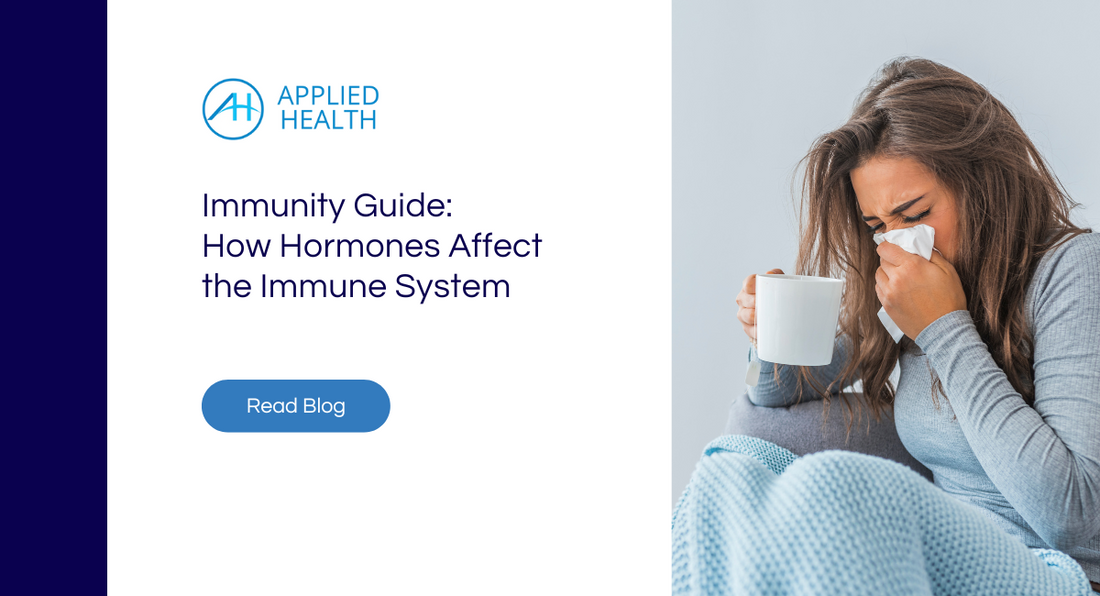Ever wonder why you get knocked out by the flu when your friend barely gets brushed by it? Or wonder why stress seems to make you more susceptible to catching a cold? It may have to do with how hormones affect the immune system.
Hormones are connected to many things we do not think about on the daily — including our immune response. These tiny chemical messengers can have incredible power over our immune system. They act like conductors of an orchestra, directing each section—thyroid, adrenal glands—to play their part perfectly.
But what happens when one musician hits a sour note? Our immunity can falter under this discordance.
Knowing how hormones affect the immune system can help you better understand how to support your body during those seasons when everyone feels extra generous to share their germs.
Table Of Contents:
- The Connection Between Hormones and Immunity
- Thyroid Hormones on Immune Response
- Estrogen and Immunity
- Progesterone and Immune Protection
- Testosterone and the Immune System
- FAQs: How Hormones Affect the Immune System
- Conclusion
The Connection Between Hormones and Immunity
Let's pull back the curtain on the unsung heroes: hormones. Acting like biological conductors, they regulate vital functions such as metabolism, growth, mood, and - you guessed it - immune health.
Which hormones are key players? Cortisol, thyroid, estrogen, and progesterone. . . just to name a few.
Thyroid and Adrenals In Immunity
The thyroid gland releases hormones that control how your body uses energy. Think of it as the gas pedal for your immune system. Without enough juice, things can slow down.
Parallel to this, our adrenal glands secrete cortisol to aid in dealing with stress. These two powerhouses work together in harmony to ensure an optimal immune response when invaders come knocking at the door. Yet, when hormones are off-balance, things can go awry for the immune response.
Cortisol and the Common Cold
Stressful life events or chronic stress can weaken your immune system. Cortisol — like that friend who's great fun at parties but terrible if you hang out too much — gives us a boost during times of stress.
Cortisol can be a lifesaver when running from saber-toothed tigers or dealing with modern-day traffic jams—but there is a catch. If cortisol levels go into overdrive (chronic stress), it starts acting more like a wrecking ball than a helping hand.
Over time, this excessive exposure weakens our defenses making us vulnerable to illness and infection — even the common cold.
Thyroid Hormones on Immune Response
Thyroid hormones play a critical role in boosting our immune response. They directly impact Natural Killer (NK) cell activity.
NK cells fight off invaders—as a first-line defense for your body. With just enough thyroid hormone levels, NK cells become more efficient at hunting down foreign invaders.
Low Thyroid Levels Decrease Antiviral Response
When thyroid hormone production struggles, it's not pretty for your immune system. Lower-than-normal thyroid hormone production can put a damper on your body’s ability to fight off viruses or maintain a healthy inflammatory response. It's like trying to run with ankle weights — everything gets harder.
Low thyroid function can lead to decreased antiviral responses and increased inflammation. Maintaining optimal thyroid levels isn’t just about feeling good – it can help keep you healthy too.

Estrogen and Immunity
The relationship between estrogen and improved immunity is a delicate dance. Estrogen, the primary female sex hormone, plays a crucial role in regulating our immune system. But just like any good dance partner, it needs to strike the right balance – not too much and not too little.
Estrogen Imbalance
An overabundance of estrogen plays a big role in throwing off not only balanced hormones but the immune system. It supports the immune system at normal levels but suppresses it when estrogen is excessively produced .
This means that if you have high estrogen levels - say due to stress or environmental factors - your body's natural immune responses may struggle more with infections or illnesses because your immune cell function is reduced.
This specifically targets your thyroid function which further dampens your immune cell responses. To make matters worse, excessive estrogen also increases inflammation by promoting the production of pro-inflammatory cytokines.
Postmenopausal Women and Weakened Immunity
What happens when there's too little estrogen? Postmenopausal women experience this due to the hormonal imbalance that comes after menopause.
A study revealed that postmenopausal women are more susceptible to infectious diseases than pre-menopausal women . The drop in estrogen weakens their immune response, making it harder for their bodies to fight off pathogens.
Another study found that women with low estrogen levels have a higher risk of developing autoimmune diseases. This means your body might start attacking its immune cells because it mistakes them for foreign invaders.
Maintaining balanced estrogen levels is critical to not only fertility and bone health but for ensuring our immune systems remain in optimal working order.
Progesterone and Immune Protection
Progesterone is a hormone that wears many hats — from supporting pregnancy to maintaining menstrual cycles. But did you know it also has an intriguing part in your immune function?
Progesterone and Autoimmune Diseases
Studies show lower levels of this crucial hormone may contribute to conditions like lupus and rheumatoid arthritis. This could partly explain why women are more likely than men to develop autoimmune diseases – they experience significant drops in progesterone during their monthly cycle.
This isn't about blaming hormones for everything but understanding how hormonal imbalances can specifically offset a woman's immune response.
Progesterone on T-cell and NK Cell Activity
T-cells? NK cells? These guys are essential components of our adaptive immune response.
Low levels of progesterone can mess with T-cell activity leading to reduced immune response. T-cells are the "special forces" of our immunity, recognizing and neutralizing foreign invaders like viruses or bacteria.
Testosterone and the Immune System
Testosterone can be like that friend who both helps and hinders — always keeps things interesting for the immune system.
Studies show that testosterone can help fight off infections. It's like having a bouncer at the door of your body, keeping out unwanted germs.
Just when we thought testosterone was our immune system’s knight in shining armor, research throws us a curveball. The same study found high levels of this hormone might suppress certain parts of our immunity.
This isn’t unlike how too much security can hinder everyday activities – imagine trying to get into your house if every door had three locks. An excess of testosterone may impede the body's ability to effectively combat germs.
A good balance is crucial because just as low levels could leave you open to attacks from harmful invaders, high levels could throw everything out of whack.
FAQs: How Hormones Affect the Immune System
What hormones are involved in the immune system?
The key players include cortisol, thyroid hormones, estrogen, progesterone, and testosterone. Each plays a unique role in a stronger immune response or suppressing immunity.
Can hormones control your immune system?
Hormones can have a leading role in how they modulate immune responses in the body. Overproduction and underproduction of certain hormones can hinder your body's ability to fight off illness effectively.
What hormone causes a weak immune system?
Cortisol, the stress hormone, is a prime culprit. Although essential for stress response and inflammation control, excessive production can weaken your immunity.
Conclusion
Understanding how hormones affect the immune system is key to helping the body stay healthy. The thyroid and adrenal glands, plus cortisol, estrogen, progesterone, and testosterone all have an impact.
Vitamin supplements that contain ashwagandha and other adaptogens can help support healthy cortisol levels. When levels are balanced, cortisol can more easily do its job in supporting stronger immune responses.
Optimal levels of thyroid hormones enhance immunity by activating natural killer cells while low levels hinder our response to viruses and inflammation.
Balancing hormones, like estrogen and progesterone impact immunity too. Either overproduction or postmenopausal low levels can weaken our defenses against illness.
And let's not forget testosterone. The complex relationship with immunity influences autoimmune symptoms, acute inflammation, and T-cell activity.
Maintaining balance is vital for healthy autoimmune response and inflammatory responses — so take care of your hormonal health!

